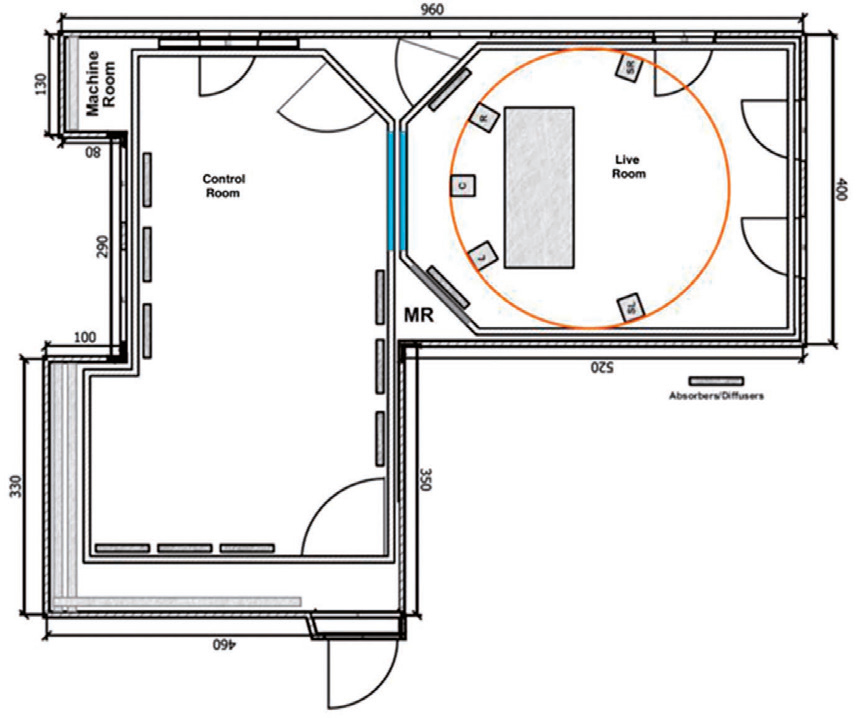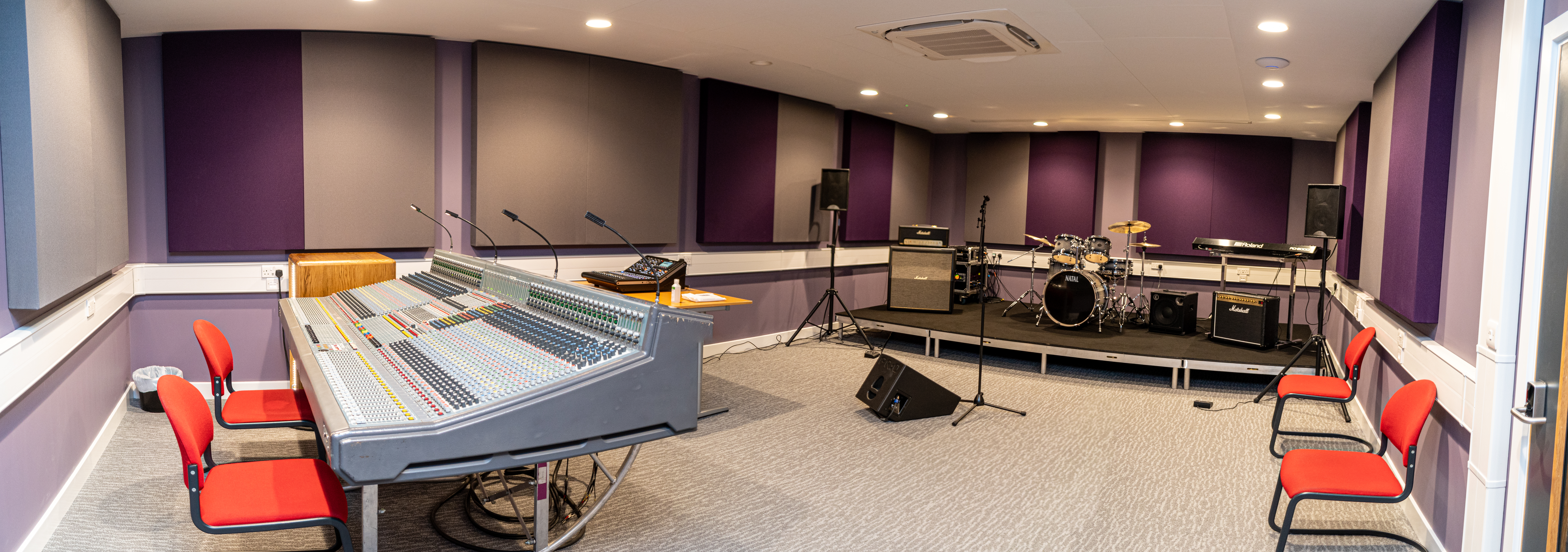
Resonance sits in the heart of the Black Country, home to some of the most iconic music legends of the last 50 years, including Led Zeppelin, Slade, Judas Priest, ELO, Black Sabbath, UB40, and many others. Supported by a wealth of industry partners including the likes of Marshall, Roland, Focusrite, Total Solutions, Creative Technology and many more, Resonance currently offers three undergraduate degrees validated by Solent University, Southampton, with plans to offer a further two soon: BMus (Hons) Popular Music Performance; BA (Hons) Popular Music Performance & Production; and BSc (Hons) Popular Music Production.
We deliver to small classes in an environment that eschews traditional classroom learning in favour of as much hands-on practical work as possible. Students get many more opportunities to use their skills every day in music performance, engineering, broadcast, and live audio work, working on briefs designed by Resonance's industry partners. The institution's delivery has been designed around a completely new approach to music and pro audio instruction, which is optimised to take students farther, faster. Many tech innovations have been put in place to help Resonance carry out its mission.
Had we known that there would be a global pandemic or been able to foresee the scale of the COVID-19 outbreak, we would have likely delayed the launch of a brand-new music institution. However, Resonance opened its doors to students as planned in September 2020, just prior to the onset of national lockdowns.


The Resonance model
As most readers of MT are fully aware, many learning institutions found themselves having to re-invent their delivery model, most notably with the change to remote online teaching. Resonance found itself uniquely placed to carry on with its planned curriculum, and even managed to maintain face-to-face teaching and hands-on practical experience for its students throughout their first academic year. This was only made possible by a combination of three factors:
- 1. Brand-new curriculum
As this was the first time for curriculum planning and delivery at Resonance, tutors were not faced with adapting an already existing delivery model. Instead, the team was able to plan all teaching and assessments – with all necessary measures in place based on government guidance – to ensure that practical and face-to-face teaching could continue.
- 2. Space
The plans to continue with a hands-on experience was made possible by the scale of the campus at Resonance. With over 45,000sq/ft of dedicated available space, Resonance was able to offer social distancing far in excess of the advice and guidance available at the time.
- 3. Dante
The final piece of the puzzle comes in the form of state-of-the-art digital audio networking. The entire campus, and every space or room within it, has been connected by five independent networks – two networks for internet connectivity, one network for high-quality video and two independent Dante audio networks.


In the past, if you wished to send an audio signal from one space to another, you would have run long lengths of copper cable connecting the two ends to a source and a pre-amp, repeating this process for every channel of audio you wished to send. Dante completely replaces all of those analogue connections with an IT network.
Using nothing more than a standard Cat5e ethernet cable, Dante is able to transfer 512 channels of high-quality pristine audio, at a sample rate of 48kHz, all while achieving a near zero-millisecond latency (practically real time). But the true power of Dante comes from the networked connection of multiple spaces or devices; utilising Dante in this way allows you to send any of the 512 available channels of audio to any other device (or multiple simultaneous devices) on the network, in any combination you can imagine without any physical changes to the wiring!
The wonderful thing about this near zero-millisecond audio delay is that we can send audio from one rehearsal room to another and have real-time band rehearsals, where it sounds and feels like the students are in the same room, even though they're isolated in their own separate rehearsal space. This allowed students to continue working collaboratively and practically on campus, while still observing social distancing.
Producing work-ready graduates
The primary use of the Dante networks on campus at Resonance is recording. The music industry has shifted in recent years to audio (and video) over IP solutions, as the clear advantages and solutions offered have made all historical methods virtually redundant. This has resulted in a skills gap in the audio industry, leaving education providers with a responsibility to train future engineers to be equipped with not only the knowledge of traditional sound engineering, but also with the knowledge to become a competent network engineer.
Resonance aims to produce work-ready graduates with a grounding in computer networking and with a specialism in audio over IP technologies such as Dante. With a pervasive network connecting all of the spaces on campus – including both common areas, teaching rooms as well as dedicated and specialised recording, rehearsal and performance spaces – students are hands on with the technology on a daily basis.
To facilitate the training of its students, Resonance has three independent recording studios, each with their own control room and live room(s) boasting analogue workflows including analogue routing, analogue mixing consoles, and hardware outboard processors where traditional engineering skills can be developed.
In addition, there are eight fully equipped and sound treated rehearsal rooms for live sound training – these eight rooms can also double up as additional studio live rooms (more on this later) – six acoustically isolated individual practice rooms, and a Mac Lab equipped with individual iMac stations, complete with audio interface, MIDI controllers and multiple DAW software options.
Once the students have developed their understanding of traditional methodologies, they can then begin to learn how this can be transformed into an audio over IP network and take full advantage of Dante, and Resonance's entire campus.
Removing physical barriers to recording
Having learnt how to operate the Dante network, the physical limitations and barriers of traditional studio recording are completely removed for students; suddenly the distance between rooms on campus, and any limits on audio channel count presented by analogue wired connections, becomes totally irrelevant. Due to the extensive networking at Resonance, the students can turn any space into a recording space, and even use multiple spaces simultaneously.
For instance, using traditional methods in one of the three recording studios, a student might only be able to record one instrumentalist at a time if they desired to capture the most pristine audio. However, using Dante, the same student could record up to a maximum of 512 individual sources at once, separated into any room in the building. Students have access to book over 40 different spaces in the building; should they so wish, students could acoustically isolate and record 40 separate musicians simultaneously, spread across the entire campus in individual spaces, with all channels of audio fed to their laptop in the café!
This infrastructure turns the entire Resonance campus into a 45,000sq/ft recording studio, with a significant portion of that space already acoustically treated and sound-proofed for a high standard of recording quality.
An ‘unparalleled’ studio experience
All of this infrastructure goes to waste without students who are passionate and dedicated to learning the craft. One such student currently studying at Resonance is Joshua Gubbins, who regularly spends his time in the studios, even outside of the teaching semesters, to hone his audio engineering skills.
When asked for his thoughts on the campus and facilities available at Resonance, Gubbins says: ‘I think that at Resonance the quality of the campus and the ability to book studios, the faculties and equipment are top-notch. Compared to other institutes that I looked at, the access to studio equipment, rehearsal rooms, practice rooms with top industry gear, is unparalleled really. The ability to come and use all that is great.’
When asked what he sees as the main benefit of studying at Resonance, Gubbins says: ‘At the moment, I would say its scale is the main advantage of studying at Resonance. When you look at other places where there might be 800 students, at Resonance you can definitely get more of a personal experience in terms of what you want to learn and getting knowledge and support from the tutors.’
Our approach embraces the reality of self-employment and the importance of developing a portfolio career, which may include a combination of performing, composing, producing, teaching, sales and marketing, and product design. In addition to our degree courses, students benefit from our own professional certificate aimed at developing the ‘soft’ skills crucial to success in an ever-changing, dynamic and global industry.
Weekly interactive seminars, guest lectures and workshops from industry leaders cover topics such as emotional intelligence, managing stress and developing confidence and resilience, as well as teamwork, leadership, negotiating, and physical, mental, and emotional wellness.
All images: Courtesy Resonance
Resonance is supported by the Black Country LEP and Midlands Engine








